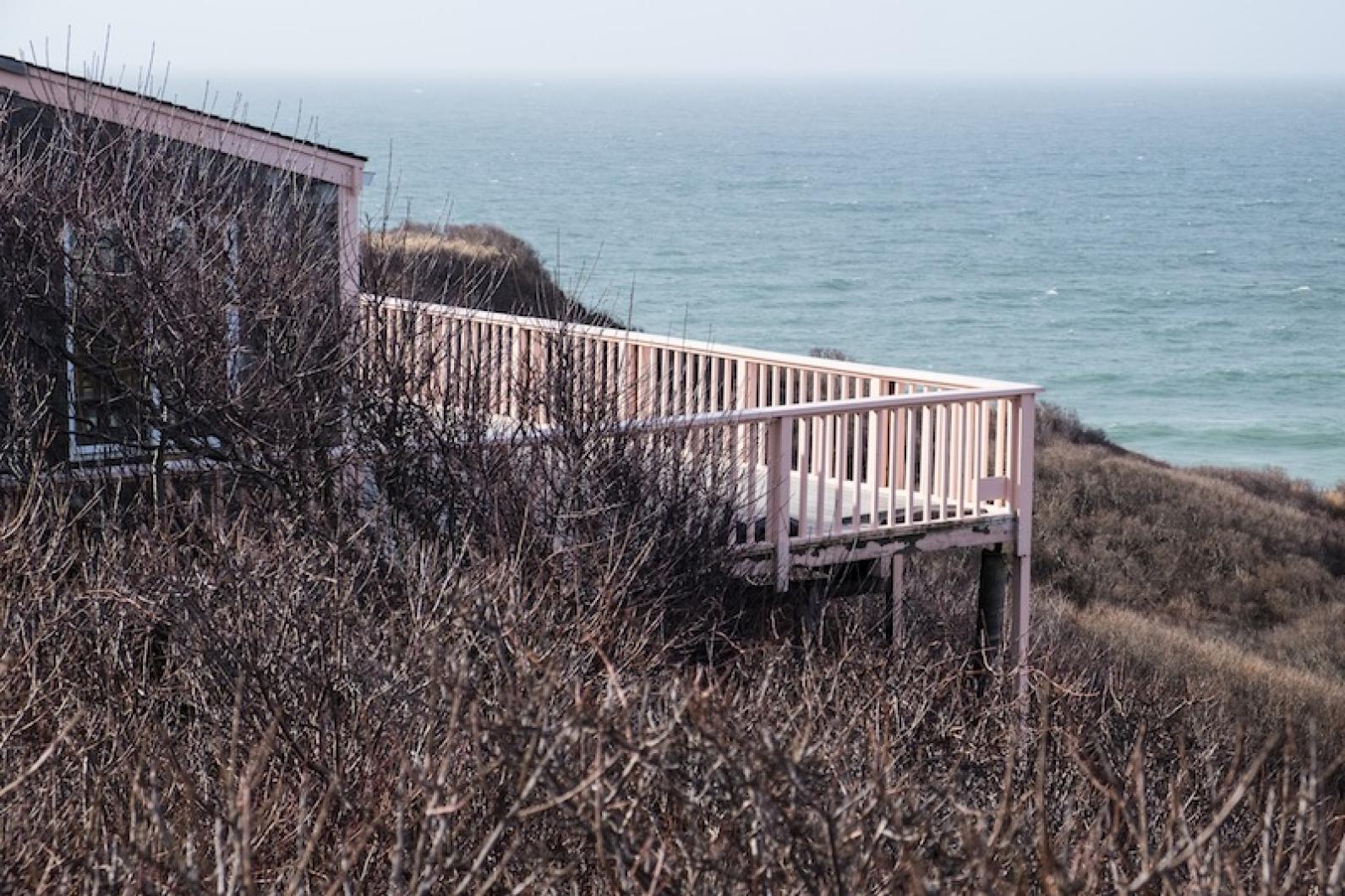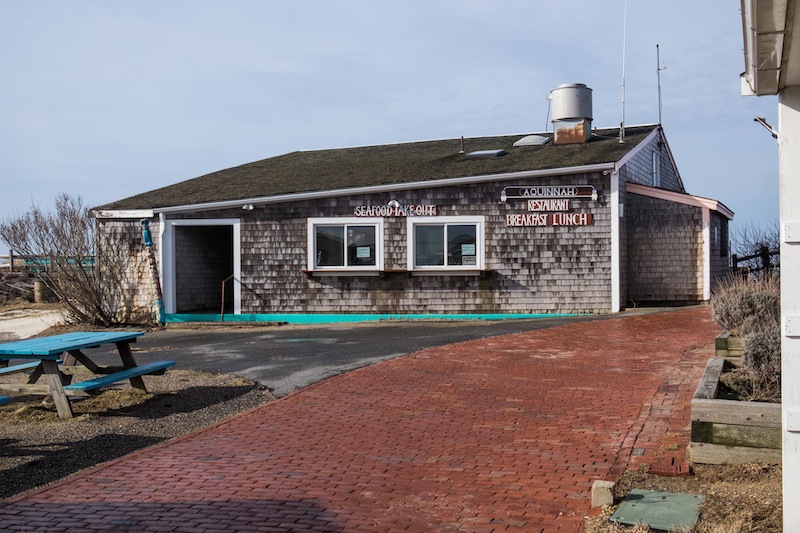The Aquinnah Circle was nearly empty this week, with all but one shop closed for the season and frigid temperatures keeping sightseers at home. On Monday, a few snowflakes blew past the Aquinnah Shop and some upturned turquoise picnic tables on the patio overlooking a sweep of the Atlantic Ocean.
But in recent days, much attention has focused on the iconic restaurant, which for decades has been a draw for Islanders and tourists alike. From Easter weekend to Columbus Day, fried clams, homemade pie and breathtaking views have been the hallmark of this place for as long as most people can remember.
On Monday, the Aquinnah Shop officially went on the market for $1.475 million, the result of a years-long dispute between brothers Matthew and David Vanderhoop, whose family started the business in the 1940s and has owned it ever since.
The circumstances of the dispute are complicated, but center on the two brothers’ shared ownership of the land and the business. David Vanderhoop owns five ninths of the property and one third of the business. But he hasn’t set foot in the shop since a falling out with his younger brother more than a decade ago.
“It was always my hope to stay in the business,” he told the Gazette this week, recalling his first job at age 10 at the shop selling souvenirs for 50 cents an hour.
Matthew (Cully) Vanderhoop did not immediately return phone calls from the Gazette.
Disagreements over the years as to how the land and business should be divided came to a head in 2013 when David Vanderhoop filed a legal petition, forcing the sale of the property.
“It’s no different than the standard inheritance situation,” said Jim Feiner, an up-Island realtor who has the listing. A so-called petition to partition is often the last resort for family members who co-own a property but can’t get along, he said, although he has never been involved in such a case on the Vineyard.
Only the property and facilities are for sale, although the business itself could be sold separately if the parties agree. Any sale of the property would be subject to court approval.
Mr. Feiner and others in Aquinnah hope the business can stay in the Vanderhoop family, which traces its roots to the native Americans who first inhabited the Island. But discussions with Island conservation groups, along with officials from the town and the Wampanoag Tribe, about buying the property and possibly leasing it back to the family have led nowhere, Mr. Feiner said.
“We are trying to rally to buy it,” said Juli Vanderhoop, a town selectman, businesswoman and member of the family who, like other Vanderhoops, worked at the shop in for many summers. “We won’t give up until the day that we have to,” she said.
Aquinnah Circle has long been the center of tribal commerce on the Island, and for years the Aquinnah Shop has stood at the helm.
The shop was founded in 1948 by Wampanoag medicine man Napoleon Madison, whose portrait still hangs above the entrance to the dining room. Other objects in the restaurant reflect its deep roots in the community, including a mounted striped bass caught by charter captain Buddy Vanderhoop, and a cabinet filled with Wampanoag artifacts.
The shop is the only business at the Circle not under a town lease.
Family members have guided the shop’s transition from a small hot dog stand to an iconic summertime destination. The family designed and built a new kitchen about 15 years ago, and the business has won accolades under Cully Vanderhoop and his son Jacob, who took over as head chef four years ago.
Five or six family members worked at the shop last summer, including Anne Vanderhoop, the family matriarch who ran the shop for years with her husband the late Luther Madison, also a medicine man for the tribe.
The shop also hosts a variety of events for the community. “That’s one of the reasons why it is such a landmark,” Juli Vanderhoop said. “We are not held by the standards of a lease.”
She recalled seeing young children grow up, and the joy of giving away the occasional muffin or ice cream cone. “The generosity of our community was kind of an unsaid thing,” she said. “It’s kind of a spiritual thing for our family as well, because it is in our blood.”
According to a court summary of a phone conference in 2014, Matthew Vanderhoop had hoped to divide the property (which is listed as 2.5 acres although there is disagreement over the size of the land area). His attorney, Robert F. Mills, noted in the report that David’s portion of the land would likely be unbuildable, but that an additional payment could make up the difference.
David’s attorney, Daniel C. Perry, argued in the report that the property could not be “advantageously divided.”
Speaking to the Gazette, David expressed regret at the circumstances. “I really don’t want to sell,” he said. “My ideal situation would be for the family to continue up there, because it’s homeland.” But he said after 14 years he had run out of options. “I’m open to any thoughts or anything that will bring this situation to a good resolution,” he said.
If the property sells, the brothers will split the proceeds according to their property shares, minus expenses. Aquinnah town administrator Adam Wilson said this week that the town would determine whether to place a lien on the property for unpaid taxes. “I believe that David Vanderhoop is significantly behind on his taxes,” Mr. Wilson said.
Any changes to the Aquinnah Shop or its use would require a special town permit. Changes could also be subject to review by the Martha’s Vineyard Commission, since the shop sits within three overlapping districts of critical planning concern (DCPCs).
“You could not build that today,” town planning board chairman Peter Temple said of the 3,100-square-foot building which sits at the edge of the tallest cliff. “But as long as they don’t change anything, I don’t see that it would get any review,” he added.
Mr. Feiner said the current use could continue, assuming the new owners reapply for a beer and wine license.
The real estate listing appears on Mr. Feiner’s website and on the Vineyard multiple listing site LINK. The land and buildings were assessed at $1.76 million in 2015. Estimated annual property taxes are $9,457. The real estate description on Mr. Feiner’s page suggests that the property could be converted to a private residence.
As of Monday, Mr. Feiner said there were no interested buyers.
News of the market listing comes as the town and tribe begin planning for the future of Aquinnah Circle, which was designated a cultural and historic district by the Massachusetts Cultural Council this year.
The town selectmen have brooded over unused lots at the cliffs, including Faith’s Seafood Shack, which closed more than two years ago following another disagreement among co-owners.
Meanwhile, at least one other business in Aquinnah is preparing for a new chapter. This week Ms. Vanderhoop, who owns the Orange Peel Bakery on State Road, signed a lease to take over Faith’s Seafood Shack, where she plans to open a second Orange Peel location. She hopes to be up and running before the summer.
“We are definitely moving forward up there,” she said.









Comments (11)
Comments
Comment policy »